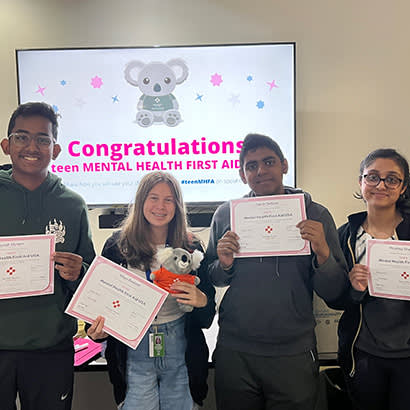
For an enhanced digital experience, read this story in the ezine.
When I was approached to teach Teen Mental Health First Aid to the members of the East Brunswick (New Jersey) Youth Council, I was immediately taken aback. Rampant thoughts of disbelief entered my mind: “How can I help anyone with their mental health?” “I am not a teacher.” “My schedule is busy enough as it is.” “Surely, these kids don’t need the help of a recreation professional!” The very thought of putting a child’s mental wellness in my hands terrified me, and it nearly dissuaded me from even considering going forward with the certification process. If it weren’t for the help of my friend and colleague, John Roche, I would not be sitting here with four years of experience and two separate certifications under my belt. Roche told me that even if we helped just one student who was going through a mental health challenge, all the work that we put in would have been worth it.
In 2021, the National Council for Mental Wellbeing announced that funding from a New Jersey Pandemic Relief Fund was being used to certify adults to teach Teen Mental Health First Aid. The course instructs adults how to teach teens (ages 15-18) to recognize warning signs of a mental health struggle and get appropriate help when needed. Through this grant, we have been able to certify more than 100 students as Teen Mental Health First Aiders. Teen Mental Health First Aiders know how to look for warning signs, ask their friends how they are, listen to their friends talk about their struggles and help their friends get appropriate help while maintaining their friendship. The grant funding has paid for all class materials and the full training of John, Caitlin Kehoe from East Brunswick’s Daisy Recreation, and me.
The team at the National Council for Wellbeing, specifically within the Mental Health First Aid chapter, made it possible to receive this training. Everyone we worked with during this training for both Youth Mental Health First Aid and Teen Mental Health First Aid was helpful, friendly and eager to teach more people about the importance of mental health. Their guidance made a world of difference, and I cannot thank them enough for all they do.
Prioritizing Wellness
In the East Brunswick Youth Council, we have made mental wellness a key part of our organization. Three times a year we offer Teen Mental Health First Aid training to our youth members and give them community service hours for completing three mandatory classes. Additionally, we make sure to offer art, relaxation, movement and outdoor wellness as a part of our daily programming. Our newly renovated youth center has an entire space dedicated to mental wellness, called Brunswick’s Cove. Perhaps one of the biggest methods we use to promote mental health is on our social media pages. While social media can have its downsides, we have found it to be a great way to promote the teens who have taken Teen Mental Health First Aid with us. Teens see their friends certified in the training, and they get inspired to take the training too. It is an awesome domino effect that has impacted not only the people in East Brunswick Youth Council, but also in East Brunswick overall.
At the start of this story, I mentioned a few concerns that were running through my mind before I was certified in Teen Mental Health First Aid. Perhaps you may have the same thoughts, and that is completely valid. If I can offer any comfort to you, I have never been surer about a decision in my life. Teen Mental Health First Aid has allowed the youth I serve to help their friends and help themselves. Caitlin, John and I have gotten so much positive feedback from our teens about how they were able to help their friends because of the training they received from us. I firmly believe that knowledge is an invaluable gift, and I am grateful to be able to pass this gift along to the next generation. The biggest lesson I have learned from this whole process is that hope and recovery are possible, and with the youth I serve, I see that possibility happening every day.
Ashley Faulcon, MPA, is Program Coordinator, Youth/Community Services at Township of East Brunswick.

